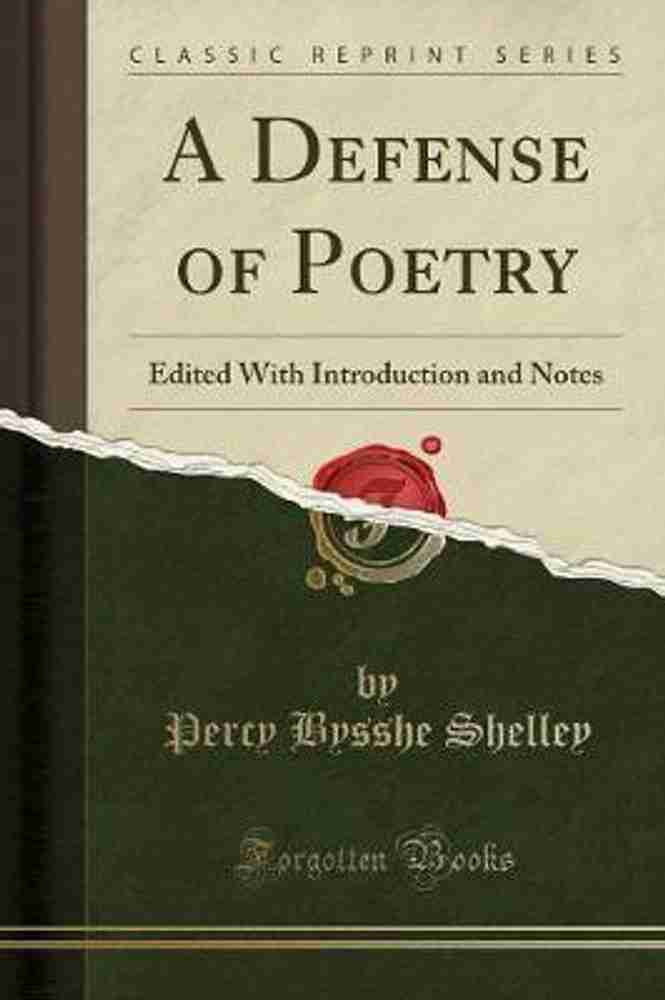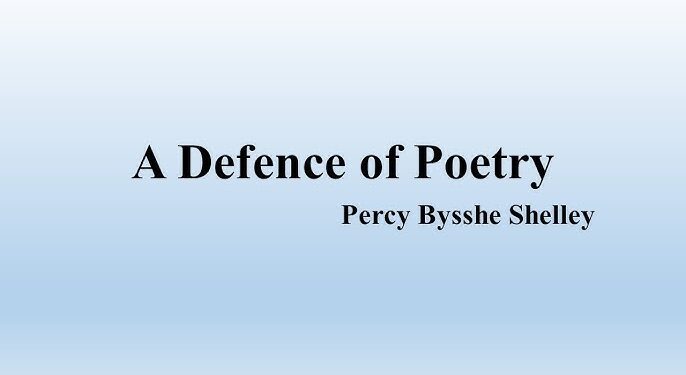Background of the Essay
A Defence Of Poetry Summary By PB Shelley “A Defence of Poetry” was written in 1821 and published posthumously in 1840. It was written in response to the criticism of poetry and the arts during Shelley’s time, particularly in light of the political and social upheavals of the early 19th century. In this essay, Shelley articulates a passionate argument for the importance of poetry and its role in society. He addresses the idea that poetry is not merely an aesthetic pursuit but a vital force for moral and social change.A Defence Of Poetry Summary By PB Shelley
Structure of the Essay
Shelley’s essay is structured into several key sections, each exploring different aspects of poetry and its significance. He begins with a discussion of the nature of poetry, followed by an exploration of the poet’s role in society, the relationship between poetry and truth, and the impact of poetry on human emotion and imagination. Shelley employs a range of philosophical and rhetorical devices to support his arguments, drawing on historical examples and personal reflections.A Defence Of Poetry Summary By PB Shelley
Read More
Summary of Key Sections
1. Definition and Nature of Poetry
Shelley begins by defining poetry as the expression of the imagination. He argues that poetry is not confined to a specific form but encompasses all expressions of human creativity and emotion. According to Shelley, poetry arises from the deepest human feelings and serves as a means of communicating universal truths. He emphasizes that poetry transcends mere entertainment; it is a profound exploration of the human experience that allows individuals to connect with one another on a deeper level.A Defence Of Poetry Summary By PB Shelley
2. The Role of the Poet
In this section, Shelley outlines the essential role of the poet in society. He asserts that poets are visionaries who possess the ability to perceive the world differently. Poets have a unique capacity to articulate the beauty and truth inherent in human existence, inspiring others to reflect on their own lives and experiences. Shelley posits that poets act as intermediaries between the ideal and the real, using their imagination to elevate society’s understanding of morality, beauty, and truth.A Defence Of Poetry Summary By PB Shelley
3. Poetry and Truth
Shelley delves into the relationship between poetry and truth, arguing that poetry reveals deeper truths that often elude rational thought. He contends that poetry transcends the limitations of logic and reason, providing insights into the human condition that are essential for personal and societal growth. By capturing the essence of human emotions and experiences, poetry offers a form of truth that resonates with individuals on a profound level.A Defence Of Poetry Summary By PB Shelley

4. The Moral Influence of Poetry
In this section, Shelley emphasizes the moral power of poetry. He argues that poetry has the ability to elevate the human spirit and inspire individuals to strive for higher ideals. Poets have a responsibility to engage with the moral implications of their work, using their influence to promote social justice and empathy. Shelley believes that poetry can foster compassion and understanding among people, leading to a more harmonious society.
5. The Emotional Impact of Poetry
Shelley explores the emotional impact of poetry, highlighting its capacity to evoke feelings of joy, sorrow, love, and longing. He argues that poetry connects individuals with their emotions, allowing them to explore the complexities of their own experiences. This emotional engagement is crucial for personal growth and self-awareness, as it encourages individuals to confront their feelings and understand their place in the world.
6. The Importance of Imagination
Shelley places significant emphasis on the role of imagination in poetry. He argues that imagination is the source of creativity and innovation, allowing poets to envision new possibilities and articulate profound truths. Through imagination, poets can transcend the boundaries of reality, exploring alternative perspectives and deeper meanings. Shelley posits that nurturing imagination is essential for both individual and societal development.A Defence Of Poetry Summary By PB Shelley
7. Poetry as a Unifying Force
In this section, Shelley discusses the unifying power of poetry. He argues that poetry has the ability to transcend cultural and temporal boundaries, connecting people across different societies and eras. By expressing universal themes and emotions, poetry fosters a sense of shared humanity, promoting empathy and understanding. Shelley believes that poetry can bridge divides and inspire collective action for the greater good.A Defence Of Poetry Summary By PB Shelley
Read More
8. Critique of Contemporary Society
Shelley critiques the state of contemporary society, lamenting the decline of artistic and intellectual pursuits. He argues that the increasing materialism and utilitarianism of his time have led to a neglect of the imaginative and spiritual aspects of life. Shelley calls for a revival of the appreciation for poetry and the arts, urging society to recognize their intrinsic value in shaping human experiences and promoting moral development.
9. The Legacy of Poetry
In the concluding sections of the essay, Shelley reflects on the enduring legacy of poetry. He asserts that poetry has the power to inspire future generations, shaping cultural and societal norms for years to come. By capturing the essence of the human experience, poetry becomes a timeless expression of beauty and truth that continues to resonate with individuals across time and space.
Key Themes and Philosophical Insights
1. The Nature of Poetry:
Shelley defines poetry as a fundamental expression of human creativity and imagination. He emphasizes that poetry transcends mere aesthetic pleasure, serving as a vital means of exploring truth and emotion.
2. The Poet’s Role:
Shelley positions poets as visionaries and moral guides, arguing that they have the unique ability to perceive and articulate deeper truths about the human condition. Poets are seen as essential to the progress of society, using their art to inspire change and elevate moral consciousness.
3. Imagination and Truth:
Imagination is a central theme in Shelley’s argument, as he contends that it is through imagination that poets can access profound truths about existence. Poetry provides insights that transcend rational thought, offering a deeper understanding of the world.
4. The Moral Power of Poetry:
Shelley highlights the moral influence of poetry, asserting that it can inspire empathy, compassion, and social justice. He believes that poetry has the capacity to elevate the human spirit and encourage individuals to strive for higher ideals.A Defence Of Poetry Summary By PB Shelley
5. Emotional Engagement:
The emotional impact of poetry is a significant aspect of Shelley’s defense. He argues that poetry connects individuals with their emotions, allowing them to explore and understand their feelings more deeply.A Defence Of Poetry Summary By PB Shelley

6. The Unifying Force of Poetry:
Shelley emphasizes the ability of poetry to transcend cultural and temporal boundaries, fostering a sense of shared humanity. Poetry is seen as a means of promoting understanding and empathy among diverse groups.A Defence Of Poetry Summary By PB Shelley
7. Critique of Society:
Shelley critiques the materialism and utilitarianism of his time, calling for a revival of appreciation for poetry and the arts. He laments the neglect of imaginative pursuits and their importance in shaping human experiences.
8. The Timelessness of Poetry:
Shelley asserts that poetry has an enduring legacy, influencing future generations and shaping cultural norms. He believes that poetry captures the essence of the human experience, remaining relevant across time.
Read More
Conclusion
In “A Defence of Poetry,” Percy Bysshe Shelley articulates a passionate argument for the significance of poetry as a vital expression of the human experience. He emphasizes the role of the poet as a visionary and moral guide, highlighting the power of imagination, emotional engagement, and the unifying force of poetry. Through his reflections, Shelley advocates for a renewed appreciation of poetry and the arts, asserting their importance in fostering empathy, understanding, and societal progress.
FAQ
1. What is the main argument of Shelley’s “A Defence of Poetry”?
The main argument of Shelley’s essay is that poetry is a vital expression of the human experience, serving as a means of exploring truth, beauty, and moral values. He defends poetry as an essential force for social change and personal growth.
2. How does Shelley define poetry?
Shelley defines poetry as the expression of the imagination, encompassing all forms of creative expression. He emphasizes that poetry transcends mere entertainment and serves as a profound exploration of human emotions and experiences.
3. What role does the poet play in society, according to Shelley?
Shelley argues that poets are visionaries and moral guides who possess the ability to articulate deeper truths about the human condition. They inspire others to reflect on their lives and strive for higher ideals.
4. How does Shelley relate poetry to truth?
Shelley contends that poetry reveals deeper truths that often elude rational thought. He believes that poetry provides insights into the human condition that are essential for personal and societal growth.
5. What is the moral influence of poetry?
Shelley emphasizes that poetry has the power to elevate the human spirit and inspire compassion and understanding among individuals. He argues that poets have a responsibility to engage with the moral implications of their work.
6. How does poetry evoke emotion?
Shelley explores the emotional impact of poetry, highlighting its ability to connect individuals with their feelings. Poetry encourages personal growth and self-awareness by allowing individuals to confront and understand their emotions.
7. What significance does Shelley attribute to imagination in poetry?
Imagination is central to Shelley’s argument, as he views it as the source of creativity and innovation. He believes that imagination allows poets to transcend reality and articulate profound truths.
8. How does Shelley critique contemporary society?
Shelley critiques the materialism and utilitarianism of his time, lamenting the decline of artistic and intellectual pursuits. He calls for a revival of appreciation for poetry and the arts.
Read More
















